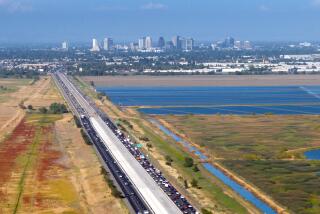House Approves Transportation Bill, O.C. Funds
- Share via
WASHINGTON — The House on Wednesday overwhelmingly approved a landmark, $151-billion transportation bill that would give states unprecedented authority to spend federal highway aid on mass transit projects.
The controversial six-year package, approved 343 to 83, includes more than $30 million for special projects in or near Orange County. The legislation received broad bipartisan support despite some lawmakers’ objections to provisions that would extend a gasoline tax surcharge and earmark $5.2 billion for more than 470 “demonstration” projects across the country.
The Orange County authorizations include $17.5 million to build special ramps connecting car-pool lanes on the Santa Ana Freeway with downtown Anaheim; $7.9 million to study ways to expand the capacity of the Santa Ana Freeway between downtown Los Angeles and the Riverside Freeway; and $4.8 million to widen Bristol Street in Santa Ana.
The sweeping legislation would set the course for national highway and mass transit policy into the 21st Century, and for the first time in 35 years restructure the way the federal government hands out aid for roads, bridges, bus systems and rail lines.
The Senate already has approved a similar measure calling for $123 billion in spending over five years. Differences in the two bills--as well as a threatened presidential veto of the House legislation--will be addressed in a House-Senate conference.
To help pay for the massive public works program, the House bill would extend for four years, until Sept. 30, 1999, a 2.5-cents-a-gallon surcharge on the federal gasoline tax that was enacted last year. The tax is now 14 cents a gallon.
The bill also calls for a drastic reduction in the $11.4 billion balance in the federal Highway Trust Fund’s highway account over the next six years.
An earlier version of the bill foundered in the House in late July after members balked at approving a proposed nickel-a-gallon increase in the gasoline tax.
Congressional supporters praised the current bill, known as the Intermodal Surface Transportation Infrastructure Act of 1991, as a vital investment in the country’s future in an increasingly competitive international environment.
“In the next century . . . the security of our nation will depend less on how fast an ICBM travels to the Soviet Union and more on how fast our commerce travels through our transportation network,” said Rep. Norman Y. Mineta (D-San Jose), one of the bill’s principal authors and chairman of the public works panel’s subcommittee on surface transportation.
But opponents, largely Republicans, attacked the proposed gasoline tax extension and what they characterized as the bill’s emphasis on mass transit over highway construction. They also assailed $5.2 billion in funds earmarked for specially designated “congressional projects of national significance.”
The so-called demonstration projects, which often bypass state planning processes, have been widely criticized by the Bush Administration and others as pork-barrel spending intended to boost representatives’ hometown popularity.
The President’s senior advisers, including Secretary of Transportation Samuel K. Skinner, have said they will recommend a veto of the bill on several grounds, including the overall spending levels, the demonstration projects and the gas tax extension. The Administration also objects to the bill’s proposal that state governments pick up 20% of the cost of projects receiving federal funds. Skinner had sought to double the state contribution to 40%.
“We have a $400-billion deficit staring us in the face,” said Rep. Dan Burton (R-Ind.), one of the bill’s chief opponents, “and yet we still allow many, many pork-barrel projects. . . . We have to get the pork out.”
“What I . . . have a quarrel with is the incredible change in policy in this bill, moving away from building highways toward mass transit,” said Rep. Tom DeLay (R-Tex.), referring to transit programs as “a failure.”
Two of Orange County’s five members of Congress--Reps. Christopher Cox (R-Newport Beach) and William E. Dannemeyer (R-Fullerton)--joined 59 other Republicans in opposing the transportation bill. Reps. Robert K. Dornan (R-Garden Grove), Dana Rohrabacher (R-Long Beach) and Ron Packard (R-Oceanside) voted with 98 other Republicans to support the measure. Rohrabacher represents northwestern Orange County, and Packard represents southern Orange County.
The House legislation would largely replace programs put in place in 1956 that were designed to finance construction of the 43,000-mile interstate highway network, which is now all but complete. Nevertheless, the bill includes $8 billion to complete the remaining interstate threads, including the Century Freeway in Los Angeles. The current federal aid programs expired on Sept. 30, the end of the 1991 fiscal year.
The bill would authorize $119 billion in spending on a variety of highway and bridge programs through the 1997 fiscal year and $32 billion for mass transit, more than double the amount of transit spending proposed by the Administration. It also would give states the authority to shift up to $51 billion of the highway funds into transit programs. Under current law, states are penalized for shifting any transportation aid from one account to another.
The Senate in June approved its own transportation bill that calls for spending $123 billion over five years, including at least $21 billion on transit projects. The Senate bill would permit even more flexibility than the House legislation, creating a $45-billion surface transportation program that could be used either for highway or transit projects.
The House bill would radically rewrite the formulas that have been used for years to apportion federal aid to the states under various transportation programs. The Senate legislation largely keeps the old formulas in place. The substantial differences between the measures must be worked out by a House-Senate conference committee.
Neither bill could guarantee that congressional appropriators would fund the transportation programs at the authorized levels. Since nearly all of the money to pay for the programs is raised through gasoline tax receipts, however, congressional aides said they do not anticipate unusually bruising battles in the House and Senate appropriations committees.
The House bill would provide California with at least $11.7 billion in transportation aid over the next six years. It would earmark at least $10.4 billion for the state under formula programs.
More to Read
Sign up for Essential California
The most important California stories and recommendations in your inbox every morning.
You may occasionally receive promotional content from the Los Angeles Times.










